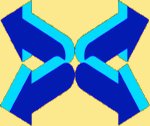
COORDINATING THE TIERS
The tier is key in organizing and coordinating the work done by the other six tiers and two sub-tiers. This includes almost everything from business licenses granted by EDIC to criminal verdicts handed down by EvIntent. It all eventually arrives at GovOps for scrutiny. The tier, however, does not influence the decisions made by the its counterparts, and only checks to make sure all legal requirements have been met and logged.
Much of GovOps' time is spent sustaining the various federal buildings and public properties. This includes menial tasks such as keeping public streets clean and in repair, power facilities are meeting peak usage requirements, and ensuring municipal employees are compensated on time.
 |
Acquilar Capitol Building -- central
offyces for members of both the Guild and Caucus. The two
top floors house Caucus chambers, The tall central floor
just above the main entrance is for Guild matters and
deliberations. The tall rectangular structures to the left and right house
central staff spaces and administration.
|
Planning and zoning for new dwellings and facilities (public and private sector) must be approved by the Sub-Offyce of Contract Approvals. Government surplus inventory purchasing and management is also handled by the tier.

Paperwork consumes most of GovOps agents' time, but another function they perform is international affairs. The Offyce of International Relays lies directly under GovOps' control, and is in charge of establishing embassies, the housing and protection of foreign ministers and guests, and acceptance and withdrawal of global/economic alliances. GovOps, along with the EDIC, maintains international economic treaties as well.
GovOps runs the national public transportation program, TransPub, which is the most adept in the world (few Ferratuus use automobiles, and then only in isolated pockets and towns not serviced by TransPub). Auto roads are maintained by GovOps public works crews, as are the TransPub rail lines.
 |
The
mass transit system common in all Ferratu cities and
towns not only eliminates the need for private
auto-vehicles and the pollution they cause, but stems from a similar system used during the Age of Udias. A similar method was used for extensive undergournd minos mining, and eventually was
used as the blueprint for contemporary passenger transit
systems. In the 30 or so years since its first run, there
have been only four (4) accidents resulting in injury or
death. Passenger on-time arrivals are at a constant of 88
percent or better. |

GOVERNMENT STRUCTURE
The people are ruled by two bodies, the March Caucus and Guild of Representatives. Guild members are duly elected every three yahrs under stringent voting regulations involving the entire populace. Once every six yahrs, after Guild members (all 81 of them) are elected, nine members are selected by popular vote for Caucus seats. Those nine join the rectors from various tiers, the Praetor, and his advisors.
 |
 |
| Caucus
party symbol |
Guild
party symbol |
The Caucus is the higher ruling body, representing the Praetor's closest advisors and governing officials. From the Caucus come all of the final decisions facing Ferrata, and those decisions become final and law. Those choices, however, cannot be brought up by any active member, and only come from the Guild. Matters that pass through the Guild's screening process move on to the Caucus for final deliberations. (This obviously has sparked political pressure from some Caucus members, called Legats, who may have political agendas of their own. It is not uncommon for a Legat with a personal agenda to petition a Representative to introduce legislation on his behalf. Such practices, though legal, are discouraged and frowned upon publicly.)
He or she who presides over the Caucus is called the "Pre-legat," and carries the honorary title 'sartaj. The leader of the Guild is the Potentiate, but carries no end-name title.
The form of government used by the Directorate combines the equivalent of contemporary democracies with monarchial systems. While the people do pay taxes and tribute to their respective representatives, they have a say in who those barons will be. Representatives present potential laws and matters of concern, but cannot vote on them. Legats, who may appear to hold the high sticks of power, cannot suggest or include doctrines not covered by or in the Guild. Even the Praetor, who can overrule and decision, judgement, or action and is the equivalent of a king in other countries (a military dictator in others), must at some point recognize the will of the people or risk being overthrown. A praetor, however, has never been relieved of office in the 300 yahrs of the Udiz.
As far as heads of state, after the Praetor comes the "Prasul Sectyr d'awaam" (second protector of the people), who is chosen by the praetor and ratified by the Caucus. If the Prasul is somehow incapacitated, the Pre-Legat would assume temporary control of national matters.

|



